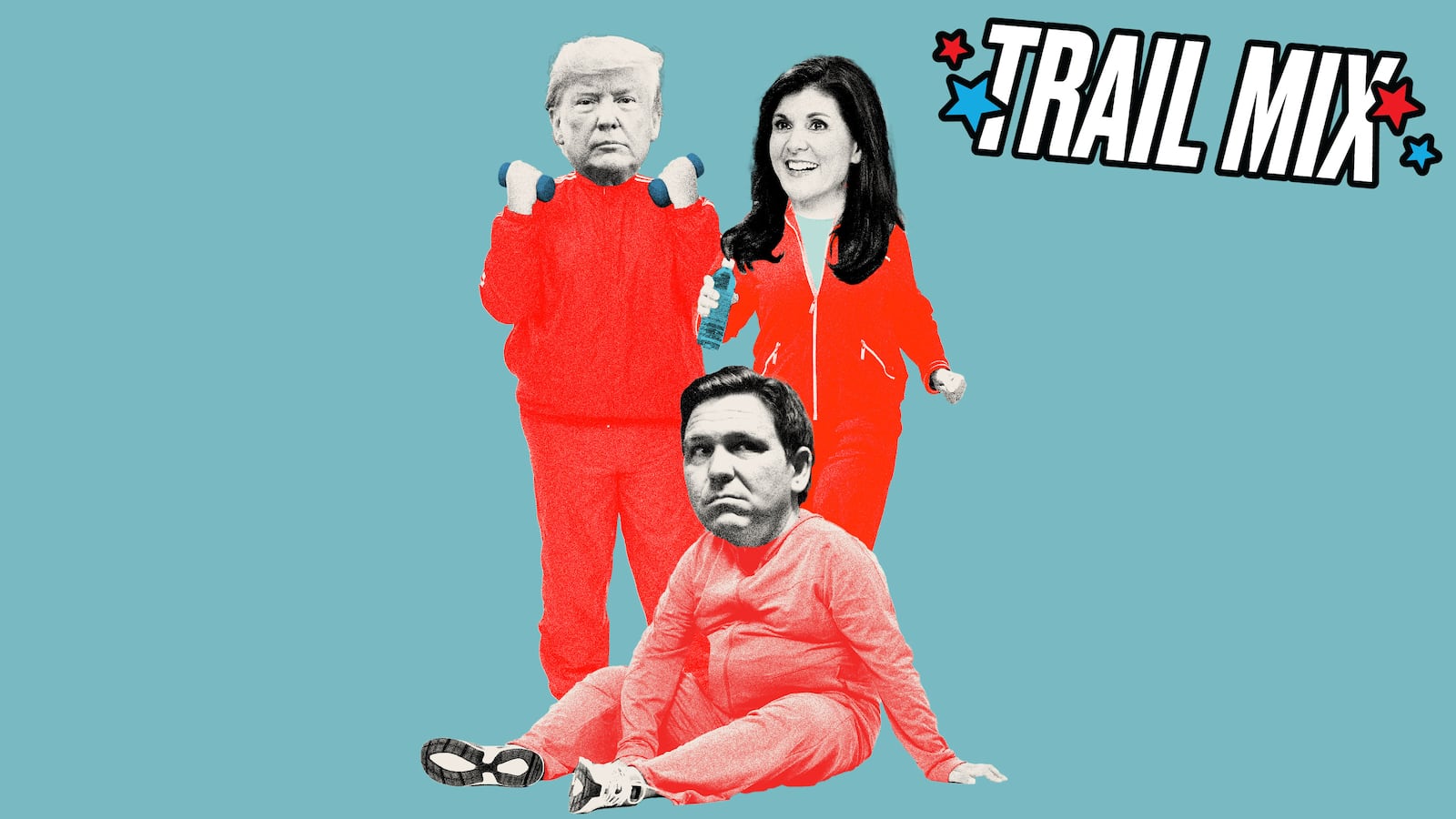Welcome to Trail Mix, your 2024 election sanity guide. See something interesting on the trail? Email me at jake.lahut@thedailybeast.com.
This week, we look at Ron DeSantis’ grim post-Iowa outlook. Plus, previews of New Hampshire’s bizarre Democratic non-primary and the state's real GOP primary.
THE ART OF BACKING DOWN
HAMPTON, New Hampshire—Just days before the New Hampshire primary, Ron DeSantis is barely going through the motions.
Thus far, his week of campaigning in the state has amounted to delivering a scarcely altered stump speech at a biker bar, a radio hit where he reflected on his campaign’s failed media strategy, and promptly flying back to Florida.
If this is the candidate who had “punched his ticket” out of Iowa, as DeSantis claimed Monday night, he certainly isn’t acting like it.
Worse still for DeSantis, his competitors aren’t acting like it either.
At a critical phase of the Republican presidential contest, DeSantis appears to be so irrelevant in the minds of Donald Trump and Nikki Haley that both candidates signaled this week they’re now running as if the Florida governor isn’t even in the race at all.
Factor in staff layoffs at his allied super PAC and the situation appears so grim for DeSantis that both Haley and Trump’s campaigns have serious doubts the Florida governor will even continue the charade before votes are cast in New Hampshire on Tuesday—let alone after.
“I think there’s a 50/50 chance that he gets out,” a senior Trump adviser told The Daily Beast, speculating on whether DeSantis would stay in before the New Hampshire primary. “And the odds aren’t really in his favor.”
The former president and his allies are, clearly, far more preoccupied with Haley, who is polling close to them in New Hampshire and is poised to mop up whatever GOP support remains for a Trump alternative. The Trump campaign even took the unusual step of blasting out to the media prepared lines of attack on Haley in advance of the former president’s campaign appearance on Wednesday.
Campaigning in New Hampshire on Wednesday, Trump indeed escalated his attacks on Haley, hoping to squash her upstart bid. By comparison, he practically left DeSantis untouched. The former president’s surrogates are doing the same, making the rounds on TV and concentrating their fire on Haley.
Although she finished about 2,000 votes behind DeSantis in Iowa, Haley is behaving very much as if the primary is a “two-person race,” as she proclaimed on Monday night. As a Haley adviser told The Daily Beast on Thursday, “We’ve moved on from Ron DeSantis.”

Florida Governor Ron DeSantis speaks to the media as he makes a campaign stop at LaBelle Winery on Wednesday January 17, 2024 in Derry, New Hampshire.
Matt McClain/The Washington Post via Getty ImagesThe candidate herself has made that quite clear. At an event in Hollis on Thursday, Haley described DeSantis as “invisible in New Hampshire.”
“He’s closer to zero than he is to me,” Haley said, referencing DeSantis’ single-digit polling in New Hampshire, most recently as low as 4 percent. The former U.N. ambassador added how she was “focused on DeSantis in Iowa, and we’re no longer focused on him.”
Instead, Haley directed more criticism than usual toward Trump. “I know Trump threw a temper tantrum about me last night,” Haley said in Hollis. “I heard that.”
Haley also hit back at “my friend Trump” for saying she didn’t want to close the border. “You saw what I said about the border," Haley told the crowd. “He said I didn’t want a wall. What I said is I don’t want just a wall. We’ve got to do more than that to make sure we have no flow coming in."
As Trump and Haley’s camps battle out the final phases of the primary, DeSantis’ machine is trying to move forward—until it isn’t.
The governor is scheduled to return to New Hampshire for a quick series of events on Friday. He’s then slated to campaign through the weekend in South Carolina, where many campaign staffers have relocated. That state, where Trump and Haley are very popular, does not hold its primary until Feb. 24.
A source close to the DeSantis campaign said the strategy shift has been sold to them as a play to outlast Haley past South Carolina, where DeSantis’ orbit expects she will lose to Trump in her home state.
In one sign that DeSantis is forging ahead, The Daily Beast can also exclusively report that the Florida governor has booked a venue for primary night in New Hampshire: the Derryfield Country Club outside of Manchester. But alarmingly, no other DeSantis events are currently scheduled for the state between Friday and election night.
According to GOP operatives who have trudged this path, DeSantis’ rivals may be right to begin pivoting to a race in which he is no longer running. After he finished a distant second in Iowa—a state where he invested and campaigned heavily for a surprise finish—“nobody is writing him a check,” said Alex Conant, a former top staffer to Marco Rubio’s 2016 campaign.
“If anything, some of his donors are probably looking to Trump to hedge their bets as best as they can,” Conant said. “I think we’re at the stage of the race where Ron DeSantis can’t be the nominee, but he’s not ready to drop out.”
This state of purgatory is a far cry from where pundits and conservative operatives expected DeSantis would wind up. For Trump and Haley, their campaigns seemingly do not have to wait for the former brightest rising GOP star to officially burn out before fighting a one-on-one campaign.
Still, the DeSantis team has been trying to signal to donors and key supporters that everything is fine, and that the money spigot is still flowing.
“People think the name of the game with DeSantis is they have enough money to outlast Haley past South Carolina,” the New Hampshire Republican close to the campaign said, requesting anonymity to relay private conversations they had with Republican donors.
Still, there are real questions about whether DeSantis actually has the money to hang on in the race.
The Never Back Down super PAC only had some $5 million in cash on hand at the end of the third quarter. Neither the PAC nor the DeSantis campaign have released their fourth-quarter fundraising numbers. Haley, meanwhile, has proudly touted her $24 million haul ahead of the Jan. 31 disclosure deadline.
“If they had any money in the bank after Iowa, that’s political malpractice,” Conant said. “Their strategy was to go all-in on Iowa. If they have a couple million dollars after that, somebody screwed up.”
At his New Hampshire town hall event Wednesday at Wally’s—a hole-in-the-wall biker bar on the beach—DeSantis hardly appeared interested in being there.
He spent about an equal amount of time attacking Trump and Haley, mostly hitting Trump on his administration’s decision to ban bump stocks and not finish the border wall.
As for Haley, DeSantis painted her as a donor-friendly candidate relying on Democrats to win in New Hampshire. (Democrats can’t vote in the New Hampshire primary unless they met an October deadline to “undeclare” their party affiliation, though many of those “undeclared” voters are independents and intend to vote for Joe Biden in the general election.)
DeSantis also went after Haley for stolen electoral valor in Iowa.
“I finished second. She didn’t,” DeSantis complained. The line received a smattering of polite applause.
At several points, Rep. Chip Roy (R-TX)—perhaps the governor’s most enthusiastic endorser—followed up on DeSantis’ answers to inject some energy into the event.
“And governor, I just want to add to that,” Roy would say, speaking at double the volume and twice the intensity. “That’s not a book ban; that’s a pornography ban.”
“That’s protecting parents and children. And that’s what the state of Florida did,” Roy said to the seemingly skeptical New Hampshire crowd, gathered at a bar known for fried haddock, open mic nights, and beer pong tournaments in the summer.
On the talk radio circuit Thursday morning, DeSantis struck a rare tone of introspection—so much so that he sounded like a candidate delivering his campaign's eulogy.
Speaking to conservative host Hugh Hewitt, DeSantis expressed regret at his early strategy of antagonizing the mainstream media. “I should have gone on all the corporate shows,” he said, longingly.
Later, talking to New Hampshire conservative radio host Jack Heath, DeSantis defended his decision to run in 2024 but looked ahead to 2028. “So when people say, ‘Oh, you can wait,’ well, I don’t know what ’28 is gonna look like,” he said.
DeSantis added he “may not have the calling” by 2028, continuing to justify why he decided to run now when “it’s more difficult” with Trump in the race.
“I had the calling now,” he said.
THE OTHER NEW HAMPSHIRE PRIMARY
No matter how many votes he gets in New Hampshire’s Democratic primary election next week, Rep. Dean Phillips (D-MN) will be no closer, practically speaking, to the party’s presidential nomination than he is right now.
The contest is happening despite the national party’s decision to strip the state of its first-in-the-nation primary status, so no delegates are up for grabs. President Joe Biden isn’t even appearing on the ballot; his allies are organizing a campaign to write him in, which is not supported by the formal re-election apparatus.

Rep. Dean Phillips speaks during a campaign event at Post & Beam Brewing in Peterborough, New Hampshire, on January 17, 2024.
JOSEPH PREZIOSO/AFP via Getty ImagesBut Phillips’ longshot challenge to Biden has been predicated on the idea that a strong performance in New Hampshire—even against an opponent who isn’t on the ballot—will loudly reinforce his core argument that voters don’t want Biden to run again.
The multi-millionaire gelato entrepreneur has invested a considerable chunk of his fortune into boosting his brand in New Hampshire. Scattershot polling of the race has revealed mixed results: some surveys show Phillips with paltry support in the single digits while at least one indicated his support could be closer to 30 percent. Biden still holds commanding leads in all of them. (Self-help guru and 2020 candidate Marianne Williamson is also on the New Hampshire ballot.)
Even if Phillips is arguably not a viable candidate overall—he’ll likely get crushed by Biden in South Carolina’s primary on Feb. 3 and is not even on the ballot in Nevada’s primary on Feb. 6—his attempt to leverage the convoluted and messy New Hampshire contest still has the potential to ruin some news cycles for the Biden team, depending on how he performs.
Should Phillips demonstrate healthy support on Tuesday—over 30 percent, perhaps—those news cycles could sting. Over 40 percent and Biden could have a PR headache on his hands, even if that result does nothing to slow his path to locking up the nomination.
Phillips’ camp is already working hard to manage expectations around the contest. “I don’t think we need to get to 30 percent,” said Jeff Weaver, the former Bernie Sanders adviser now working for Phillips. A “decent showing” in New Hampshire, followed by another one in Michigan on Feb. 27, “will change the dynamics of this race,” Weaver told The Daily Beast.
Rep. Ro Khanna (D-CA), a Biden ally who has helped organize the write-in campaign effort with other Democratic heavy hitters, was reluctant to make any predictions about results in an interview with The Daily Beast. A write-in effort for an incumbent president—one not actually supported by any campaign itself—is a totally untested proposition.
“I’m certainly not going to put a percentage number out there, but I expect the president will win comfortably,” Khanna said. “It’s not going to be a close race. I think that’s a pretty big feat, given he’s explicitly skipping the race.”
No matter what, however, communicating around those results is likely to be a challenge. The vagaries of the New Hampshire primary situation—from the write-in campaign to Phillips’ strategy—have been puzzling even to close political observers.
News organizations will aim to cover the results with the proper context, but the Minnesota congressman is banking on an impressive percentage to juice his campaign, even if that campaign doesn’t appear to have any path to picking up delegates after New Hampshire.
To some operatives, if Phillips doesn’t win outright, the Biden team is not going to have to sweat too much in messaging around the outcome.
“Dean losing, in a race Biden is not even competing in... a loss is a loss, it’s hard to spin that,” said one Democratic strategist who supports Biden.
In the eyes of the Phillips team, of course, it won’t be impossible to spin a loss. Weaver described the write-in campaign as a “full court press” from the Biden team, citing the phone banking and direct mail efforts to reach voters, even if the official campaign is not involved.
“It is about demonstrating that there is a large number of people looking for an alternative” to Biden, Weaver said.
Asked about how Biden allies would communicate around a more surprising performance from Phillips, Khanna said, “I would say that the vast majority of voters supported President Biden’s vision even though he never stepped foot in the state and despite his opponents running vigorous campaigns in the state.”
“Now, the primary goes to South Carolina and Nevada and Michigan, where the President is campaigning, and he’s going to have even more decisive victories,” Khanna said.
—reported by Sam Brodey
TURF WARS
There are two key variables heading into Tuesday night’s New Hampshire primary which should decide whether Haley pulls off an upset or whether Trump gets one critical step closer to locking up the nomination.
Perhaps the most important for Haley is turnout among left-leaning independent voters.
In a strange 2024 cycle in which the Democratic primary is worth zero delegates and the likes of Phillips and Williamson are running against a write-in campaign for Biden, non-Republican voters may be much more inclined to vote in a GOP primary than they otherwise would be.
For others, a chance to defeat Trump might be more than enough of a reason to dive into a GOP primary for the first time, especially if the alternative is convoluted and effectively meaningless.
The second variable is how moderate Republicans and the rest of the independent vote shake out.
There are a few corridors in the state where Haley needs to rack up as many votes as possible to compete with Trump’s most reliable pockets of support in the state. Take University of New Hampshire professor Dante Scala’s “Kasich towns,” referring to the 2016 runner-up in New Hampshire, former Ohio Gov. John Kasich.

Nikki Haley, speaks during a campaign event held at the Alpine Grove Event Center on January 18, 2024, in Hollis, New Hampshire.
Joe Raedle/Getty ImagesThe statewide polling data has told a tale of two primaries, with Suffolk University’s polling—including the most recently available poll released during primary week—showing Trump with a healthy lead over Haley, which currently sits at 16 points.
A post-Iowa poll from Saint Anselm College also had Trump with a double-digit lead, sitting at 52 percent support over Haley at 38 percent. That’s down 4 points from their poll earlier in January, but still accounts for a hefty lead.
Polling from UNH, on the other hand, has shown a tighter race, finding Haley within just 8 points of Trump. An American Research Group poll taken right before the Iowa Caucus showed Haley and Trump tied at 40 percent each.
Suffolk has traditionally sampled Republican voters more aggressively, but they had about the same share of GOP respondents compared to undeclared ones as the UNH poll.
In one of those “Kasich towns,” Peterborough, the U.S. Secret Service initiated a walk through for a potential Trump campaign event in the town’s historic town hall, a source familiar with the planning revealed to The Daily Beast.
Bedford, a growing and wealthy town which accounted for the third most votes in the more populous Hillsborough County in 2016, could be the ultimate litmus test for whether Haley has a chance of toppling Trump. If Trump is having trouble with Bedford voters—perhaps best described as “Country Club Republicans”—then Haley might be able to keep it close.
But watch out for more working-class cities and towns, like Rochester, Seabrook, and Dover. Trump could run up the score in those areas—and he could receive a big boost from the more rural western part of the state, as he did in 2016 and 2020.
For Haley to have a real shot, she needs to beat Trump—or come close—in the rich towns like Portsmouth, Rye, and Stratham, all part of Rockingham County. Then, she’d need to work him to a draw in the most populous battleground cities like Manchester and Nashua in Hillsborough County and keep his gap manageable in those Trump hotbeds like Rochester, where Haley held an event on Wednesday.
Haley’s primary week campaign schedule has already featured multiple stops in all of those key areas. And she’ll appear in Bedford on Friday morning.
OFF THE BEATEN PATH
The One Thing Trump and DeSantis Can Agree On
At both Trump’s Portsmouth rally on Wednesday and DeSantis’ town hall event in Hampton, the candidates made the same alarmist prediction.
“If you look at what’s coming across the border, it’s overwhelmingly military-age males,” DeSantis said, referencing the high numbers of migrants entering the U.S. through Mexico. “There will be a terrorist attack. I mean I hate to say… There’s gonna end up being an attack that people can trace back to somebody that came across the border.”
Trump was even more certain.
“You can almost predict within a percentile—I would say 100 percent certain that you’re gonna have a major terrorist attack in our country, because of what they’re letting into our country on the southern border,” Trump said during his rally Wednesday night at the Sheraton Portsmouth Harborside Hotel.
Even though New Hampshire shares a border with Canada and not Mexico, border security has become a top issue for Republican voters in the state—usually spoken about in the context of fentanyl overdoses—but Trump and DeSantis took the paranoia to another level on Wednesday.
CAMPAIGN LIT
Vivek’s swan song. From the tundra of Iowa, Sam Brodey reports on how Vivek Ramaswamy incurred Trump’s wrath right before dropping out and endorsing him.
Track changes. The former president made some final revisions to his prepared remarks from Iowa on caucus night to avoid attacking Haley and DeSantis, Jake Lahut and Sam Brodey exclusively reported.
The courthouse steps campaign. Jose Pagliery details how Trump almost got kicked out of court in New York on Wednesday.
The Chuck-Mitch bromance. Archenemies Senate Majority Leader Chuck Schumer (D-NY) and Minority Leader Mitch McConnell (R-KY) have quietly morphed into something like allies on several key issues, Riley Rogerson reports.
A snow day at the Trump hotel. New York magazine’s Shawn McCreesh encapsulated the mood at the Hotel Fort Des Moines, which turned into Iowa’s Mar-a-Lago for caucus week.










